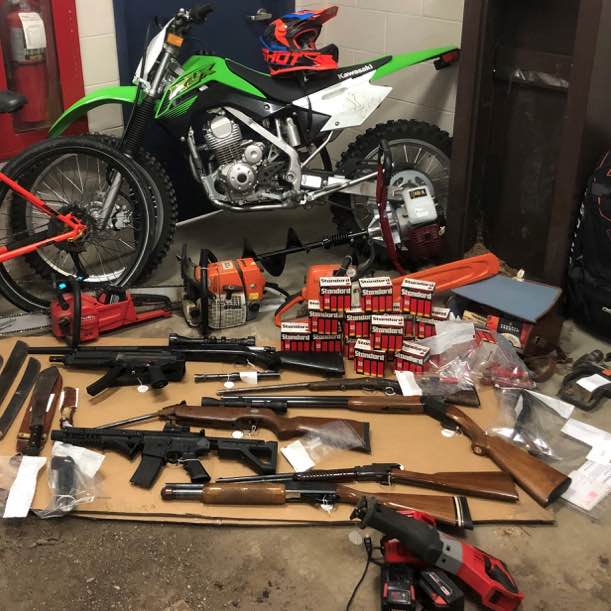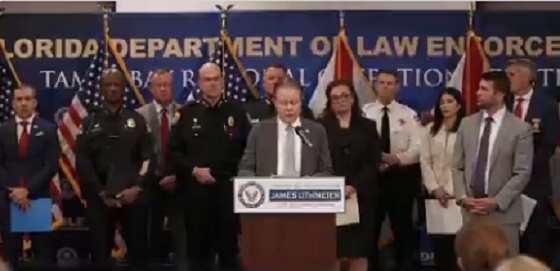Crime
Investigation of attempted home invasion at Innisfail leads to six arrests

From Innisfail RCMP
Innisfail RCMP work with multi partners to seize stolen property and charge six suspects
A report of an attempted home invasion on Feb. 18 led to the arrest of six property crime suspects and the recovery of a substantial amount of stolen property by Innisfail RCMP.
The Innisfail RCMP responded in the evening of Feb. 18 to the attempted home invasion near downtown Innisfail. Two males were reported as trying to break into the home while in possession of weapons.
The two suspect males were identified by the RCMP. On Feb. 19 Innisfail RCMP with the assistance of the Central Alberta District Crime Reduction Unit and RCMP Air Services attended a property on the C+E Trail in Red Deer County, north of Penhold, to arrest the suspects. One was arrested without incident and the second fled in a Ford F350, with two other occupants, recently stolen out of Saskatchewan. A pursuit ensued, and efforts were made to deploy tire deflation devices, but they were not successful.
The F350 travelled throughout the central Alberta area to a location near Pigeon Lake, where three occupants abandoned the F350 and were picked up by a second Ford dually pickup truck. The dually was under observation as it travelled back into Red Deer where all 5 occupants were eventually arrested at two different locations in the city with the assistance of the Red Deer City RCMP, Innisfail Integrated Traffic Unit and the RCMP Police Dog Services.
On Feb. 20, Innisfail RCMP with the assistance of RCMP Calgary Auto Theft and Blackfalds GIS executed a search warrant at the C+E Trail property. The RCMP seized items related to many property crime investigations throughout Central Alberta including: stolen firearms, ammunition, a stolen dirt bike, stolen tools, break-in tools and other weapons. The dually was examined by the Calgary Auto Theft Unit and found to be a cloned (different VIN) vehicle that was stolen 3 years ago from a ranch near Strathmore.
The following persons all from the Red Deer area have been charged as follows:
Gary Auvigne (45) is facing over 20 criminal code charges, including break and enter, use a firearm while committing an offence, utter threats, possession of a stolen firearm and breach of a release document (x6).
Thomas Larkin (41) is facing 17 charges including break and enter, possession of a stolen vehicle, possession of break in tools, flight from police and dangerous driving. He is also charged with breaching a release document (x7).
Katherine Young (29) and Thomas Foshay (36) are both charged with possession of a stolen vehicle and possession of break-in tools.
Adam Bogusky (36) is facing seven criminal charges including possession of break in tools, fraudulent concealment, possession of a weapon for a dangerous purpose, dangerous operation of a vehicle and flight from police.
Kameryne Boyd (21) is charged with possession of break in tools, fraudulent concealment and possession of a weapon for a dangerous purpose.
Auvigne and Larkin were held in custody pending Judicial Interim Release hearings scheduled for Feb. 26, 2021 in Red Deer Provincial Court. Young and Foshay participated in Judicial Interim Release hearings and were released by a Justice of the Peace for future court dates. Bogusky and Boyd were released by police for first appearance court dates on April 6, 2021 in Red Deer Provincial Court.

Crime
Suspected ambush leaves two firefighters dead in Idaho

Quick Hit:
Two firefighters were killed and another wounded Sunday after a gunman opened fire on first responders tackling a blaze near Coeur d’Alene, Idaho. The shooter was later found dead, and authorities believe the fire may have been set to lure crews into an ambush.
Key Details:
- The ambush began around 2 p.m. local time as fire crews arrived at a brush fire and were met with sniper-style gunfire from a wooded area.
- SWAT teams located the deceased suspect roughly five hours later, with a weapon nearby. His identity has not yet been released.
- The Kootenai County Sheriff said the ongoing fire could not be addressed during the gunfight, calling the attack a “heinous direct assault” on first responders.
Diving Deeper:
A deadly ambush on Sunday afternoon left two Idaho firefighters dead and a third injured after they were shot while attempting to contain a brush fire on Canfield Mountain. The surprise attack reportedly began around 2 p.m., when bullets suddenly rained down on emergency crews from hidden positions in the wooded terrain near Coeur d’Alene.
Authorities now believe the blaze may have been deliberately set as bait. Kootenai County Sheriff Bob Norris described the situation as “an active sniper attack,” saying the scene quickly escalated into chaos with gunfire coming from multiple directions.
“We don’t know if there’s one, two, three or four [shooters],” Norris said in an early evening press conference. “I’m hoping that someone has a clear shot and is able to neutralize [the suspect], because they’re not showing any signs of surrendering.”
Roughly five hours after the first shots were fired, SWAT officers found a body next to a firearm along the Canfield Mountain Trail. Authorities have not confirmed whether the individual was the sole assailant, nor have they publicly identified the person. The FBI, along with state and local agencies, had been deployed to the scene to assist with the operation.
The two firefighters who died have not yet been named. The third, who sustained a gunshot wound, was transported to Kootenai Health and remains hospitalized. His current condition is unknown.
The firefight effectively halted efforts to contain the brush fire, which remained active late into Sunday. “It’s going to keep burning. We can’t put any resources on it right now,” Norris said during the standoff. Shelter-in-place orders were issued for the surrounding area, including the popular Canfield Mountain Trailhead, but those restrictions were lifted after the suspect was found dead.
Idaho Governor Brad Little reacted to the tragedy on social media, calling the ambush “a heinous direct assault on our brave firefighters.” He added, “Teresa and I are heartbroken. I ask all Idahoans to pray for them and their families as we wait to learn more.”
Federal and local officials are continuing to investigate the incident, including the origins of the fire and whether additional suspects may have been involved.
Crime
Florida rescues 60 missing kids in nation’s largest-ever operation

Quick Hit:
Florida authorities have recovered 60 “critically missing” children in a two-week operation across the Tampa Bay area. The joint state and federal effort, dubbed Operation Dragon Eye, led to eight arrests and uncovered new human trafficking investigations.
Key Details:
-
The children, aged 9 to 17, were found across Hillsborough, Pinellas, and Pasco counties. The operation was carried out with help from the U.S. Marshals, state prosecutors, and local police departments.
-
Florida Attorney General James Uthmeier confirmed eight individuals were arrested on charges including human trafficking, child endangerment, and drug-related offenses. Additional investigations are underway.
-
The Florida Department of Law Enforcement (FDLE) hailed the operation as the most successful child recovery effort in U.S. history, declaring, “Florida doesn’t look the other way — we hunt predators and bring kids home.”
🚨 MAJOR BREAKING: U.S. Marshals and Florida officials announce LARGEST single child rescue operation in American history.
Over 2 weeks, 60 KIDS are safe, in custody.
This involved over 20 agencies and 100+ people. 8 people were arrested, charged with human trafficking, child… pic.twitter.com/trkcFMhtmX
— Eric Daugherty (@EricLDaugh) June 23, 2025
Diving Deeper:
Over a two-week span, law enforcement agencies across Florida joined forces for what’s being called a historic child recovery mission. Dubbed Operation Dragon Eye, the coordinated effort led to the rescue of 60 critically missing children—some as young as 9 years old—in the Tampa Bay region, including Hillsborough, Pinellas, and Pasco counties.
According to Fox 13, federal and state agencies worked alongside local law enforcement, with direct involvement from the U.S. Marshals Service and Florida prosecutors. The term “critically missing,” as defined by the Marshals Service, applies to minors facing heightened threats such as exposure to violent crime, sexual exploitation, substance abuse, or domestic violence.
Florida Attorney General James Uthmeier praised the operation’s success in a statement posted to social media Monday. “We will keep fighting evil head-on and bringing accountability to those who harm children,” he said, confirming eight suspects had been taken into custody, with additional investigations now underway related to human trafficking networks.
Charges filed against the arrested individuals include human trafficking, child endangerment, custodial interference, and drug possession.
The Florida Department of Law Enforcement described the effort as “the most successful missing child recovery operation in American history.” In a statement, the agency said its analysts and field agents “were proud to stand shoulder to shoulder with the U.S. Marshals” and emphasized that “Florida doesn’t look the other way.”
Several nonprofits and local support groups played a vital role in caring for the recovered children, including More Too Life, the Children’s Home Network, Bridging Freedom, Bridges of Hope, Family Support Services of Pasco and Pinellas, and Redefining Refuge.
Dr. Katherine Gomez of the Florida Department of Juvenile Justice said many of these children had felt hopeless and alone. “Oftentimes these young people have felt like there’s no one in their corner. They feel abandoned… like they have to look out for themselves because no one else will,” she told WFLA.
FDLE Commissioner Mark Glass acknowledged the emotional toll such operations take on officers, who are exposed to the trauma these children endure. “They have to see everything that happens to these children, and we need to pray for them because they had to take that burden home,” he said.
Glass added that while the operation struck a major blow to human trafficking in the region, the threat remains. “The fight isn’t over.”
U.S. Marshal Bill Berger of the Middle District of Florida warned that traffickers often return to their victims if not apprehended. “If the offenders are not apprehended, they will reconnect with these children. They are, in my opinion, leeches,” Berger stated.
Officials vowed continued vigilance to keep predators behind bars and ensure every vulnerable child is found and protected.
-

 COVID-199 hours ago
COVID-199 hours agoOntario man launches new challenge against province’s latest attempt to ban free expression on roadside billboards
-

 Energy17 hours ago
Energy17 hours agoThis Canada Day, Celebrate Energy Renewal
-

 Business1 day ago
Business1 day agoWhile China Hacks Canada, B.C. Sends Them a Billion-Dollar Ship Building Contract
-

 Alberta1 day ago
Alberta1 day agoSo Alberta, what’s next?
-

 Alberta8 hours ago
Alberta8 hours agoAlberta Next Takes A Look At Alberta Provincial Police Force
-

 Bjorn Lomborg1 day ago
Bjorn Lomborg1 day agoThe Physics Behind The Spanish Blackout
-

 Alberta10 hours ago
Alberta10 hours agoCanadian Oil Sands Production Expected to Reach All-time Highs this Year Despite Lower Oil Prices
-

 Business12 hours ago
Business12 hours agoPotential For Abuse Embedded In Bill C-5





